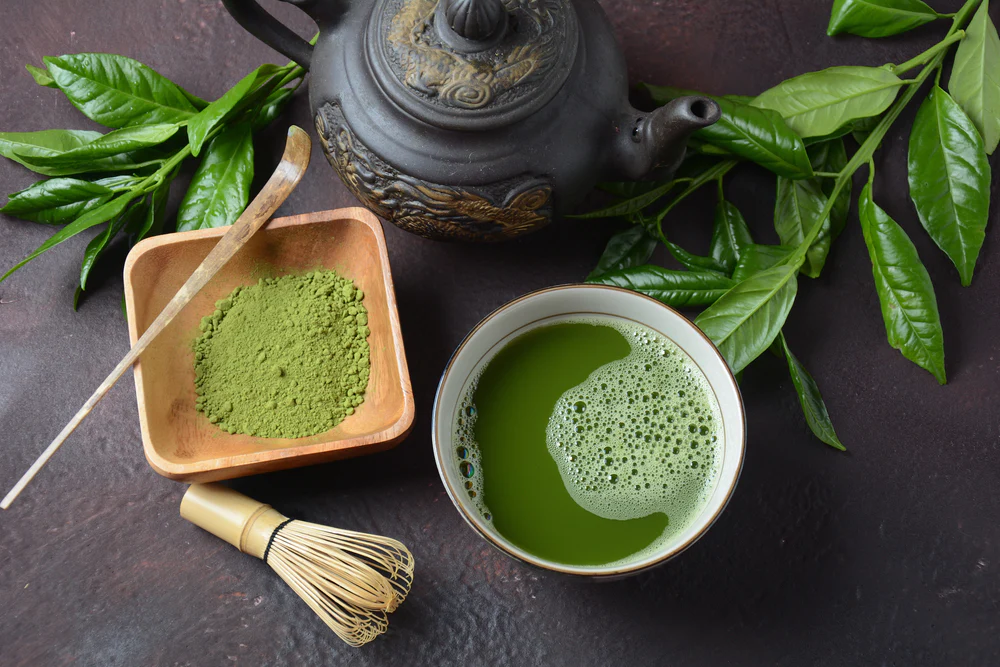Walk into a modern cafe and it’s a given you will see a striking green drink in a customer’s hand. That creamy, comforting, and perfectly Instagrammable one? It’s a matcha latte. At Kula cafe, we don’t treat matcha latte as just another trendy drink. We aim to provide a multi-faceted experience which blends culture, wellness, and delicious energy. This article will delve further into the exact health benefits the green drink matcha offers, and as a cafe, we would also discuss why matcha is suddenly trending.
In this blog, we are going to unpack why matcha lattes have become such a huge global phenomenon amongst health-centric city-dweller types, as well as the health benefits of matcha that render it much more than just a pretty drink.
What is Matcha?
Matcha is ground green tea made from Camellia sinensis leaves that were grown in the shade prior to being harvested and finally ground into powder. In other words, you are consuming the leaves whole and powdered when you enjoy matcha, as opposed to steeping green tea where you throw the leaves away when you are done steeping the tea (the beverage). This organic methodology allows you to receive all nutrients, and then some.
Historically, matcha started in China, but its spiritual and cultural home is Japan, where it became a part of their tea ceremony tradition. And now, loved around the world for its sometimes bitter, sometimes sweet, earthy flavour, health benefits, and calming effects.
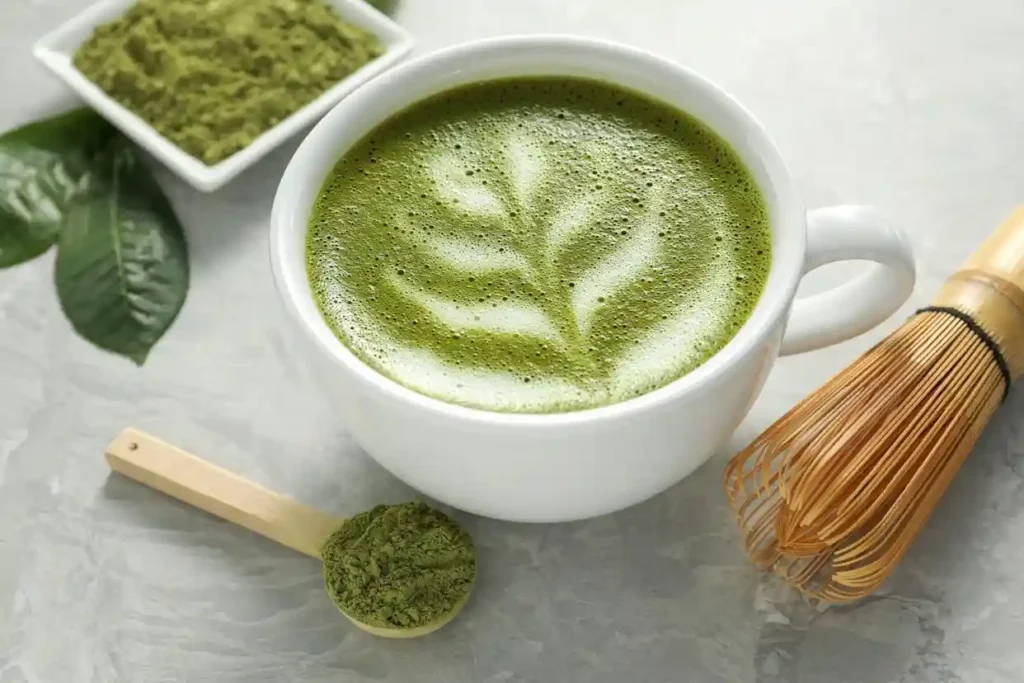
Why Is Gen Z (and Everyone Else) Obsessed with Matcha?
Across the world, from LA to London, matcha lattes have penetrated café menus and Instagram feeds. While surely a trend, matcha embodies a generation that prioritizes wellness, sustainability, and alternative energies.
- Aesthetic Component: The bright green color of matcha is popular with food photography and social statuses.
- Caffeine alternative: For individuals who do not want to crash after caffeine, matcha gives a sense of longer energy without crashing.
- Health component: The reputation of being high in antioxidants and detox, further to looking for calm energy, has made matcha a popular beverage for health and fitness consumers.
- Celebrity support: The endorsements of high-profile figures such as Michelle Keegan and Gwyneth Paltrow further add to the appeal for the average consumer.
Health Benefits of Matcha
1. High in Antioxidants
Matcha is high in catechins (plant compounds that are a type of natural antioxidant), and the most widely known of the catechins is EGCG (epigallocatechin gallate). Some have suggested that EGCG may aid in reducing inflammation and free radical damage and may help in preventing chronic disease, at best. Matcha contains up to 137 times more antioxidants than regular green tea and has one of the highest natural sources of antioxidants.
2. Supports Heart Health
Several studies have suggested drinking matcha regularly may help reduce LDL (bad) cholesterol and triglycerides, as well as aid heart health. Matcha also contains anti-inflammatory properties that can help promote blood vessel and circulation health.
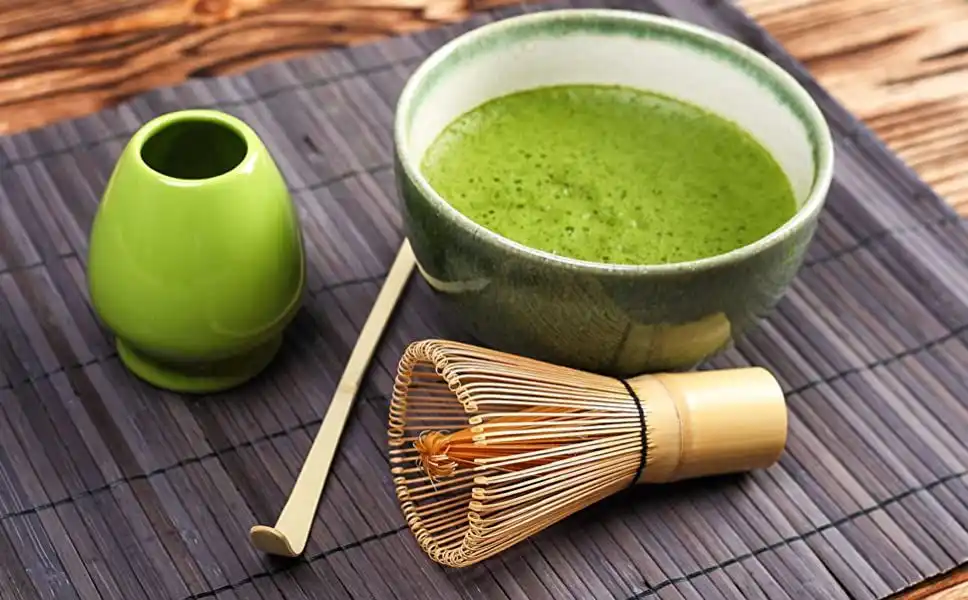
3. Improves Brain Function
The unique combination of caffeine and L-theanine that matcha contains helps to create relaxation without drowsiness. The combination of caffeine and L-theanine helps to increase attention, reaction time, memory, and even mood- but without the jitteriness that may be experienced with caffeine.
4. Increases Metabolism & Aids in Weight Loss
Some studies and research have suggested that matcha increases fat oxidation and thermogenesis (the body burning calories). Consumed with moderate exercise, matcha may also help you maintain a healthy weight.
5. Promotes liver function
The liver plays an important role in detoxifying our body, and may protect the liver while drinking matcha. Some studies have concluded that matcha can lower liver enzymes, which are markers/conclusions about liver function.
6. Helps regulate blood sugar
Matcha has also been suggested as a potential option to support insulin sensitivity and regulate blood glucose. This would be a nice option for anyone facing potential prevention or management of type 2 diabetes.
7. Cancer Prevention
Although early stage and with more human studies still needed, there are some lab and animal studies showing that EGCG found in matcha inhibits cancer cell growth. So, while there have been plenty of good findings to do more human studies, there are still plenty of positive early findings given.
8. Skin and Hair Benefits
With the high level of antioxidants in matcha, this may also help protect against harmful oxidative stress, which is shown to reduce skin wrinkles occurring from aging, as well as hair loss from oxidative stress. Consuming consistent doses of matcha (daily) may help improve skin quality and texture, along with conditions like acne and dullness.
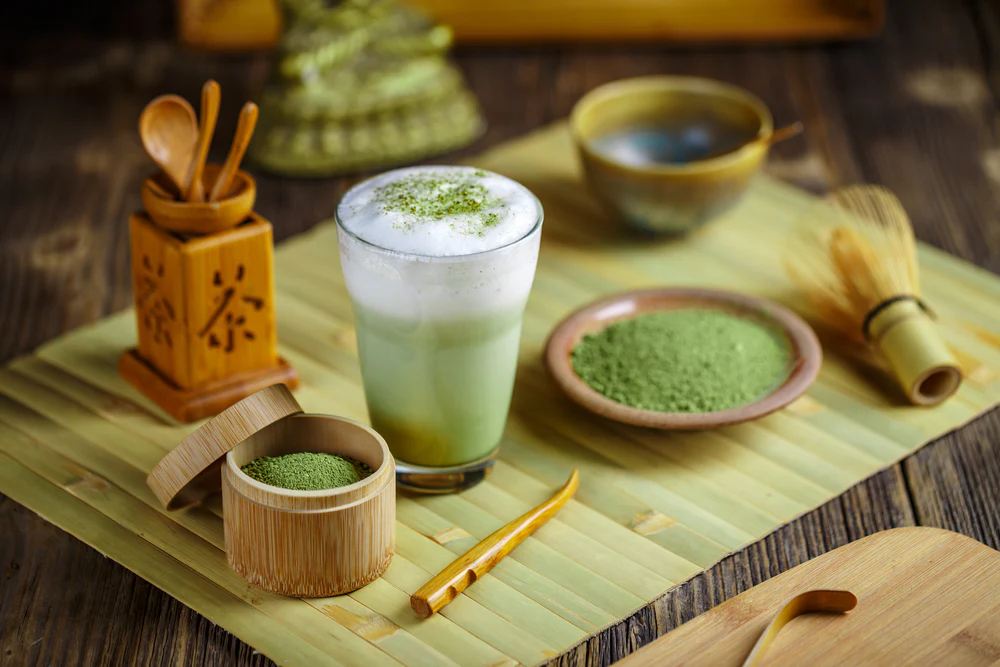
Is Matcha Good for Skin?
Yes, Matcha is good for the skin, both for consumption and topical use. It contains beneficial antioxidants and the advantages over more commonly promoted antioxidants (vitamin C), such as EGCG (Epigallocatechin gallate), which is unique to green tea. There are plenty of reasons to consider matcha over normal sources of antioxidants found in vitamins and food, as antioxidants are responsible for fighting free radicals.
Here are some major benefits of matcha skincare:
| Benefits | |
| Acne & Redness | The anti-inflammatory properties of matcha can help soothe angry, irritated skin, moderate red skin, and help avoid breakouts. |
| Slows Aging | Antioxidants in matcha stimulate collagen production to minimize fine lines/damage and enhance skin elasticity. |
| Detoxifies Naturally | Matcha assists in the removal of toxins, which contribute to cleaner skin and fewer blemishes. |
| Brightens Skin Tone | Consuming matcha could potentially help achieve an overall brighter, balanced complexion. |
As you can see, simple sips of matcha as a hot latte or by using on your face as a face mask, matcha for clear skin is definitely a wonderful natural holistic option for anyone looking to improve their beauty from within.
At Kula Cafe, we are all about providing a clean and nourishing ceremonial-grade matcha. So with every cup you drink, you are moving towards better skin!
Is Matcha Better Hot or Cold?
There are benefits and drawbacks to hot matcha and iced matcha, but ultimately, it’s a personal choice based on your likes, seasons/moods, and health initiatives.
Hot matcha lattes are wonderful if you are trying to create a relaxing, grounding ritual for yourself. The heat allows for the earthy notes of ceremonial-grade matcha to shine, as well as aid in digestion (this is ideal for the colder months). Most people have hot matcha lattes because they support sustained energy levels and mental clarity to kick-start the day.
Conversely, iced matcha lattes are refreshing, tasty, and the perfect drink on summer days, or when you need a quick, refreshing energy boost! Cold matcha retains its antioxidant properties the same, but the presentation is what grabs the “on the go” Gen Z and the wellness-loving people.
At Kula Cafe, we offer both hot and iced matcha lattes crafted with premium matcha powder and your choice of lactose or non-lactose milk options. Whether you’re cozying up or cooling off, view our drinks menu to explore your next matcha experience!
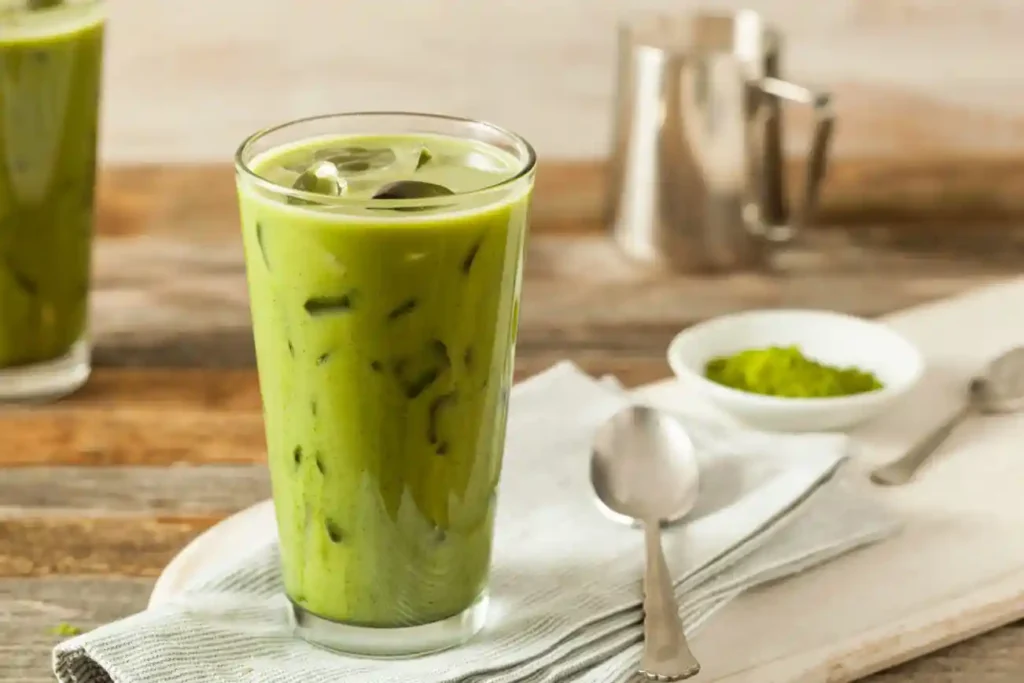
Matcha vs. Coffee: Which is the Better Caffeine Alternative?
Matcha contains an average of 70-120mg of caffeine, depending on the preparation method. Because it contains L-theanine, the caffeine is absorbed more slowly into the bloodstream. You will achieve a more constant level of energy rather than the big spikes and crashes associated with coffee.
Additionally, since it is less acidic, it may be better to drink for your stomach if you are caffeine sensitive.
How to Drink Matcha the Right Way
You want to have ceremonial or barista-grade matcha for a cleaner product and a better flavor. Avoid drinking it too soon after a high-iron meal, and enjoy it around mid-morning or early afternoon for optimal energy.
When drinking matcha, there are a couple of things to remember:
- Drink only ceremonial or barista-grade matcha to have the purest product with the best-tasting flavor profile.
- Avoid drinking right after a high-iron meal because it can inhibit the absorption of iron.
- Drink it in the mid-morning or early afternoon to stay within the energy-boosting window.
At Kula cafe, our matcha latte is created using our best quality powder, with plant-based or dairy milk, sweetened naturally and simply hot or iced as you want it.
Why you should try Kula Cafe’s Matcha Latte
If you’re looking for the best soy matcha latte in London Kula Cafe is your final stop! Kula cafe is located centrally in London, and it has a warm and creative atmosphere that serves high-quality food. Our baristas love to make special creations for our customers; whisking in the matcha, finding the most creamy alternative, and everything in between. Our Matcha latte is the best matcha latte for all first timers or to have when you want to crush those cravings!
At Kula cafe, we aren’t serving you matcha; we aim to serve you an experience. Our matcha lattes are:
- Whisked to a foam, a whipped cap, such that all you taste is the smooth and creamy texture.
- We only use premium matcha, which means you are getting all the benefits of matcha and astronomically better-tasting matcha.
One way or the other, whether you are taking your cup to go or taking your sweet time for a slow, mindful brunch, our matcha latte should undoubtedly be a marker of your wellness rituals.
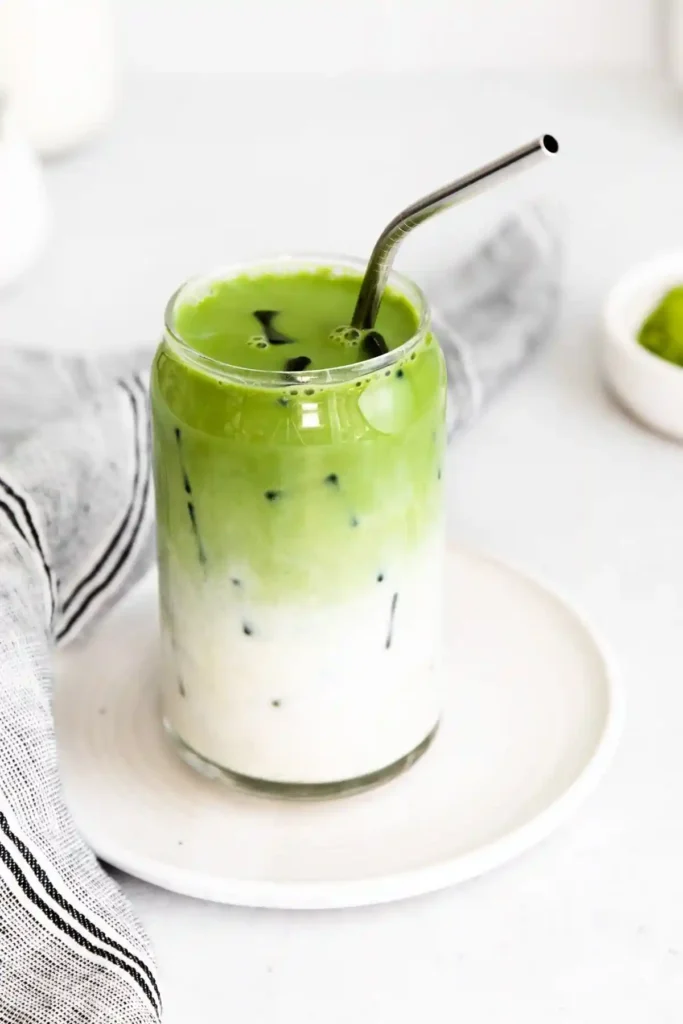
Frequently Asked Questions (FAQs)
1. Is matcha better than coffee?
Yes! Matcha provides a calm and focused experience, without the jitters and crash from coffee. Matcha has EGCG and antioxidants, along with supporting heart health and mental clarity, which makes it good for many.
2. Does matcha help you lose weight?
Matcha can help you lose weight as it helps improve metabolism and increase fat oxidation, especially if you have matcha before your workout or as a low-calorie energy drink, which means it uses fat to run on and helps burn calories.
3. Is matcha good for skin?
Yes, it is! For much the same reasons as green tea, matcha has a very high amount of antioxidants that combat inflammation and free radicals, which gives clearer skin, reduced acne and sagging, and slows aging.
4. What is the caffeine content of a matcha latte?
A matcha latte will have between 70-120mg of caffeine, depending on the matcha powder used. In conjunction with l-theanine, the energetic release you would get will be much smoother and last much longer than coffee, with less anxiety or sleep loss.
5. Where do you get the best matcha latte in London?
Kula Cafe is known to have the best matcha latte in London. They use ceremonial-grade matcha, plant-based milk options, natural sweeteners, and the ideal ratio.

